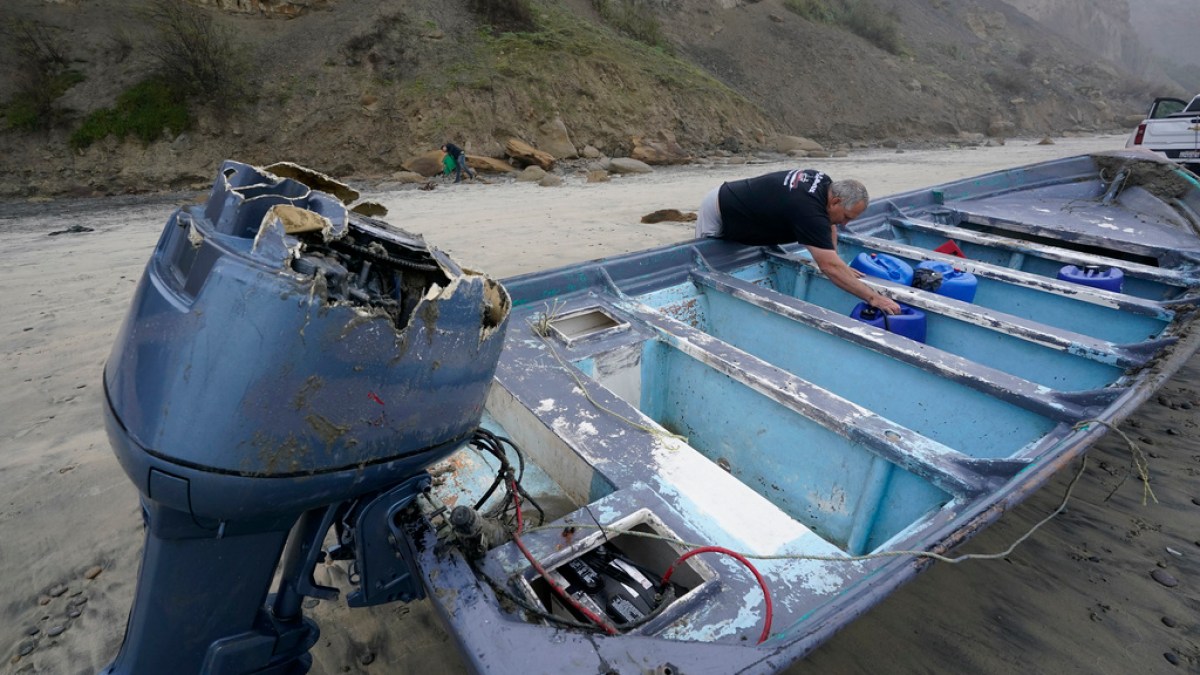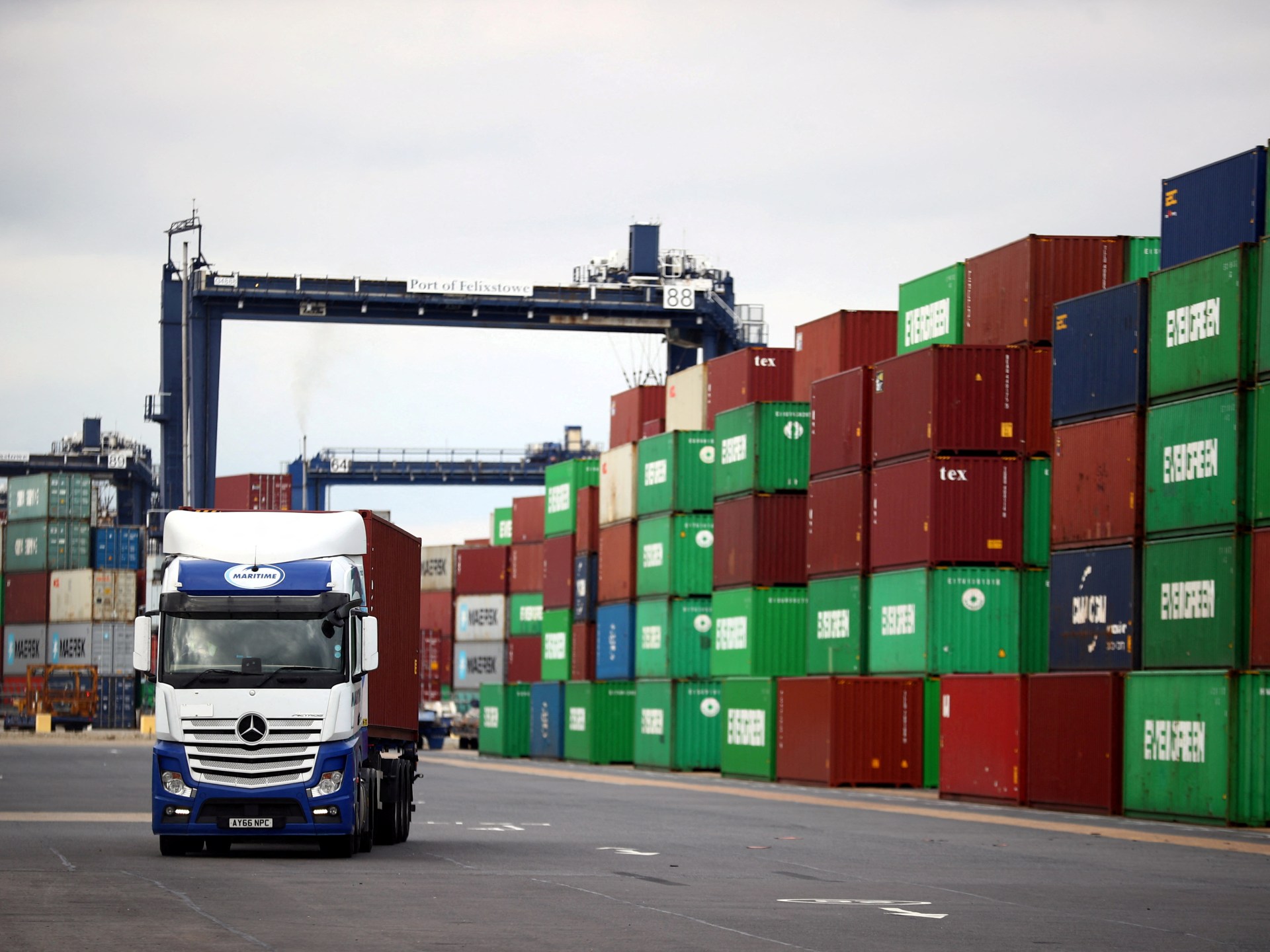Fact check: Were three drunk Ukrainians arrested in Qatar? | Explainer News
A fake Al Jazeera video online claims ‘drunken’ Ukrainian football fans were detained over ‘Nazi symbols’ in Doha.
Kyiv, Ukraine – A fake video ascribed to Al Jazeera that claims “drunken” Ukrainian football fans spread “Nazi symbols” in Doha has been circulating online since Tuesday.
In less than a minute, the video “reports” that three Ukrainians were detained after they painted a “Hitler moustache” on La’eeb, the 2022 World Cup’s mascot, and scribbled a Nazi salute next to it.
It also alleges that the Ukrainians purportedly destroyed 10 more posters in the vicinity of the Al Bayt Stadium in Doha, where the championship is taking place, before they were detained.
The video first appeared on Tuesday, November 22 and has been widely shared on social media, with some posts retweeted thousands of times.
— Al Jazeera PR (@AlJazeera) November 24, 2022
To a beginner’s eye, the video looks real.
The style is similar to that of Al Jazeera social media clips, but the stadium’s name is spelled incorrectly – El Beit, instead of Al Bayt, and some of the language is not in the style of Al Jazeera’s journalism. One sentence reads: “At the time of their arrest, the Ukrainians made no resistance.” Such a phrase would not have escaped our copy editors.
Mnar Adley, editor of MintPressNews, a left-wing website, was among those who sent out a tweet with the video.
At the time of writing, her post had been shared by more than 2,000 Twitter users.
“Ukrainians were arrested in Qatar after they drew swastikas on football posters,” she wrote, alongside the video, to her following of 23,300 users.
#Ukrainian football fans were detained in #Doha #Qatar . They were spreading nazi symbols on the walls. They’ve been in custody so fare.#Qatar2022 #QatarWorldCup2022 #QatarWordCup2022 #Ukraine #UkraineWar #UkraineRussiaWar️ pic.twitter.com/HqWemouOyI
— Il Cimmero (@CimmeroIl) November 22, 2022
User @LogKa11, who has almost 14,000 followers, wrote “Nazi Ukrainians were arrested in Qatar after they drew swastikas on football posters”, as they shared the video. The post was retweeted more than 800 times on their feed, which shares pro-Russian content.
Let’s look at it closely to understand how and why the video has been designed and spread:
What does the video show – and not show?
- It begins with several seconds of footage showing a crowd of fans in Doha. The Al Jazeera watermark is seen in a corner, a bid to prove authenticity.
- The faces of the three “Ukrainians” are not shown once.
- Instead, there are images of cheering men with Ukrainian flags that have not necessarily been taken in Qatar or after the war began in February – because men aged 18 to 60 are not allowed to leave Ukraine.
- The video does not mention the names, ages or any other personal information about the three Ukrainians.
- This omission contradicts the way police reports or press releases are written. This is not the way Al Jazeera conducts its journalism.
- The video shows only one “vandalised” poster with La’eeb – without adding any details about its exact location.
- There is also no video sequence showing the “vandalised” poster from at least two angles.
- There are no reactions from Ukrainian diplomats who have to be immediately notified about the detention of Ukrainian nationals – especially if the charges involve the propaganda of Nazism.
- When the viewer reads the line alleging that the Ukrainians did not resist, the video footage only shows Qatari police officers and the blurred face of someone they appear to be talking to.
Are there really Nazis in Ukraine?
- The video’s main message about the “Ukrainian Nazis” follows how pro-Russian misinformation circulates on the internet.
- “The basic Russian narrative for export is the allegedly ‘Nazi’ character of Ukraine’s political regime,” Kyiv-based analyst Aleksey Kushch told Al Jazeera.
- The Kremlin and the media networks it funds and controls have for years been doubling down on what it calls the “threat of Ukrainian Nazism”.
- While President Vladimir Putin has tried to monopolise Russia’s role in defeating Nazi Germany and its World War II allies, and diminish the role Western nations played in the victory, his government has appropriated far-right and ultra-nationalist slogans.
- They call Ukrainian President Volodymyr Zelenskyy’s government a “Nazi junta”, omitting the fact that Zelenskyy hails from a Russian-speaking Jewish family, and his grandfather lost his family during the 1941-45 Nazi invasion of Ukraine.
- The claims “serve as justification of the war both for [a] domestic [Russian] audience and for foreign [audiences]”, Kushch said.
- While there are several outspoken far-right, ultra-nationalist and white supremacist groups in Ukraine, that rally with torches and attack anyone who criticises them, their current influence on Ukraine’s political life is not widespread.
- The Azov Battalion, a volunteer military unit lionised for its defence of the southeastern Ukrainian port of Mariupol, admitted that in 2014 it enlisted volunteers who openly professed neo-Nazi views.
- One of Azov’s founders, Andriy Biletsky, was a lawmaker in the Verkhovna Rada, Ukraine’s lower house of parliament, between 2014 and 2019.
- But he decided not to run for president in the 2019 election in which Zelenskyy won with 73 percent of the vote.
Why does the video come out now?
- The video was released on Twitter at a time when the micro-blogging platform is being widely criticised.
- Billionaire Elon Musk took over Twitter in late October, and the platform is undergoing rapid changes and staff cuts that have called into question its ability to moderate news content.
- Twitter added a paid subscription feature that shows any paying customer as a verified account holder, but critics say the step led to a proliferation of fake accounts.
What are the risks of misinformation on the war in Ukraine?
- Since the World Cup is the most publicised global event this year, anything related to it could be widely circulated among tens if not hundreds of millions of people.
- As Western nations outlaw and filter “traditional” Russian-backed news organisations, such as the RT television network, Moscow is switching to new ways of delivering its pro-government narratives.
- While the video is not directly linked to any Russian propagandists, it unashamedly promotes the Kremlin’s view of Ukraine.
- “This information operation is aimed at ruining Ukraine’s global image and has definitely been conducted by Russian intelligence,” Kushch said.




